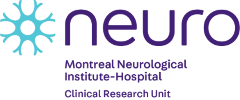A look back at the highlights of 2021

By Sophie Lorenzo
January 10, 2021
2021 was a busy year at the Clinical Research Unit at The Neuro (CRU). Despite the challenging circumstances related to the pandemic, the CRU safely conducted over 100 clinical trials in 11 areas of neurology. In many instances, the CRU was the only site in Quebec, or in Canada, offering an investigational treatment to patients.
This past year, we were lucky to be part of exciting research testing new pathways for many neurological and rare diseases. Here are some notable stories from 2021 that you may have missed.
ALS
- Existing medication, novel pathway: Thanks to a partnership with researchers at the Weizmann Institute of Science in Israel, the CRU is conducting a phase Ib/II trial testing an existing medication that researchers hope will impact microRNA levels in individuals with ALS.
- Hope for young adults: Sporadic ALS with mutations in the fused in sarcoma gene (FUS) is a particularly aggressive form of the disease, one that mainly affects pediatric and young adult patients. The CRU is the only site in Canada studying a promising antisense oligonucleotide (ASO) therapy for FUS-ALS.
- Expanding genetic testing: Research increasingly supports the idea that it is critical to identify individuals who may not have a family history of ALS but who may still carry genetic mutations related to ALS. We have been leading national and international efforts to make this a reality.
BRAIN TUMOUR
- Hope for recurrence: Glioblastoma is an aggressive brain cancer that will recur in 90 percent of patients. Only a small number of drugs are available to treat this cancer, but an innovative multimodal trial at the CRU hopes to speed up testing of several experimental therapies.
DEMENTIA
- Advances in Alzheimer’s research: The CRU is the only site in North America which took part in the first-ever trial of an antisense oligonucleotide (ASO) therapy that aims to stop the production of tau and slow the progression of Alzheimer’s disease.
MOVEMENT DISORDERS
- Tracking symptoms with smartphones: Two trials at the CRU are using a promising smartphone application to track the development of symptoms in those with Parkinson’s Disease and REM Sleep Behaviour Disorder. The hope is that data collected from remote monitoring can reliably track motor and non-motor symptoms and detect subtle changes to help better target treatment.
MULTIPLE SCLEROSIS
- Better targeting disease: A new wave of research being undertaken at the CRU looks to target both arms of the immune system in treating MS, using BTK inhibitors. The hope is that these treatments may selectively remove unwanted B cells while leaving “helper” cells alone, reducing the impact of standard immunosuppressing treatments.
- Transitioning from pediatric care: The CRU partnered with the MS Society of Canada for a webinar to help demystify the transition from pediatric to adult care for young people living with MS. A neurologist, patient advocate and young adult shared experiences as well as the top things to do to prepare for the change.
NEUROMUSCULAR
- New treatments on the horizon: Exciting news for individuals with Myasthenia Gravis! Two investigational treatments studied at the CRU had promising Phase III results and have been submitted for FDA approval. These potential treatments could offer new options in treating this neurodegenerative disease.
STROKE
- Preventing stroke in patients with atrial fibrillation A study at the CRU is evaluating the best course of treatment for patients who have suffered a brain bleed and have a history of atrial fibrillation. The study will examine whether there is an increase in the risk of re-bleeding in patients taking Edoxaban vs ASA to prevent stroke.
For more on ongoing trials at the CRU, visit cru.mcgill.ca.
